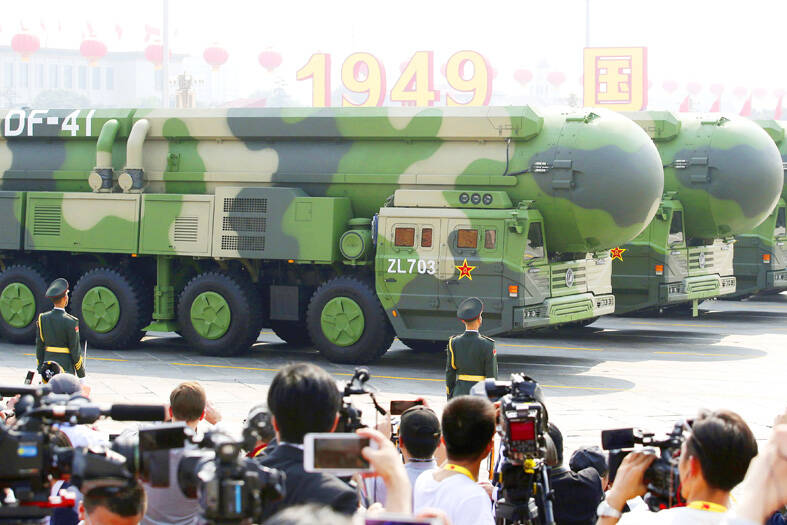China is on track to have 1,000 operational nuclear weapons by 2030 in a development likely to accelerate US nuclear arms modernization, a Taiwanese expert said in the Mainland Affairs Council’s (MAC) latest monthly report.
Beijing is strengthening the striking power of its nuclear triad in the form of the Chinese People’s Liberation Army (PLA) air force, navy and rocket force, Tung Hui-ming (董慧明), an associate professor of Chinese military studies at National Defense University, wrote in the report.
The PLA had 500 operationally available nuclear weapons as of May last year and is working to double that amount, he said.

Photo: Reuters
The DF-41 intercontinental ballistic missile, which can be launched from silos, road vehicles and railcars, is a flexible and dependable system that forms the backbone of the PLA’s deterrence capabilities, Tung said.
The design of the Type 094 nuclear-powered ballistic missile submarine showed Chinese scientists have made strides in reducing the noise and increasing the payload of submarines, enhancing the credibility of China’s sea-based deterrence, he said.
China is also developing the DF-51 intercontinental ballistic missile, Type 096 nuclear-powered ballistic missile submarine and Xian H-20 bombers, advanced weapons systems capable of serving as nuclear strike platforms, Tung said.
These systems represented significant breakthroughs in the effective range, stealth and penetration capabilities of Chinese weapons, as well as Beijing’s resolve to obtain more powerful nuclear arms, Tung said.
The US believes these efforts are enabling China to obtain more nuclear capabilities than the minimum quantity necessary to achieve deterrence, which would increase uncertainty in the regional balance of power, Tung said.
The increase in the PLA’s nuclear deterrence capabilities has substantially affected the global strategic equilibrium, spurring the US and its allies to take countermeasures, he said.
The US most likely would hasten nuclear arms modernization to strengthen its strategic deterrence while other regional powers make changes to their strategic posture to strengthen defensive alliances, he said.
The international community faces the challenge of striking a balance between achieving security and maintaining regional stability, he said.

Prosecutors in New Taipei City yesterday indicted 31 individuals affiliated with the Chinese Nationalist Party (KMT) for allegedly forging thousands of signatures in recall campaigns targeting three Democratic Progressive Party (DPP) lawmakers. The indictments stem from investigations launched earlier this year after DPP lawmakers Su Chiao-hui (蘇巧慧) and Lee Kuen-cheng (李坤城) filed criminal complaints accusing campaign organizers of submitting false signatures in recall petitions against them. According to the New Taipei District Prosecutors Office, a total of 2,566 forged recall proposal forms in the initial proposer petition were found during the probe. Among those

ECHOVIRUS 11: The rate of enterovirus infections in northern Taiwan increased last week, with a four-year-old girl developing acute flaccid paralysis, the CDC said Two imported cases of chikungunya fever were reported last week, raising the total this year to 13 cases — the most for the same period in 18 years, the Centers for Disease Control (CDC) said yesterday. The two cases were a Taiwanese and a foreign national who both arrived from Indonesia, CDC Epidemic Intelligence Center Deputy Director Lee Chia-lin (李佳琳) said. The 13 cases reported this year are the most for the same period since chikungunya was added to the list of notifiable communicable diseases in October 2007, she said, adding that all the cases this year were imported, including 11 from

China might accelerate its strategic actions toward Taiwan, the South China Sea and across the first island chain, after the US officially entered a military conflict with Iran, as Beijing would perceive Washington as incapable of fighting a two-front war, a military expert said yesterday. The US’ ongoing conflict with Iran is not merely an act of retaliation or a “delaying tactic,” but a strategic military campaign aimed at dismantling Tehran’s nuclear capabilities and reshaping the regional order in the Middle East, said National Defense University distinguished adjunct lecturer Holmes Liao (廖宏祥), former McDonnell Douglas Aerospace representative in Taiwan. If

The Mainland Affairs Council (MAC) today condemned the Chinese Communist Party (CCP) after the Czech officials confirmed that Chinese agents had surveilled Vice President Hsiao Bi-khim (蕭美琴) during her visit to Prague in March last year. Czech Military Intelligence director Petr Bartovsky yesterday said that Chinese operatives had attempted to create the conditions to carry out a demonstrative incident involving Hsiao, going as far as to plan a collision with her car. Hsiao was vice president-elect at the time. The MAC said that it has requested an explanation and demanded a public apology from Beijing. The CCP has repeatedly ignored the desires